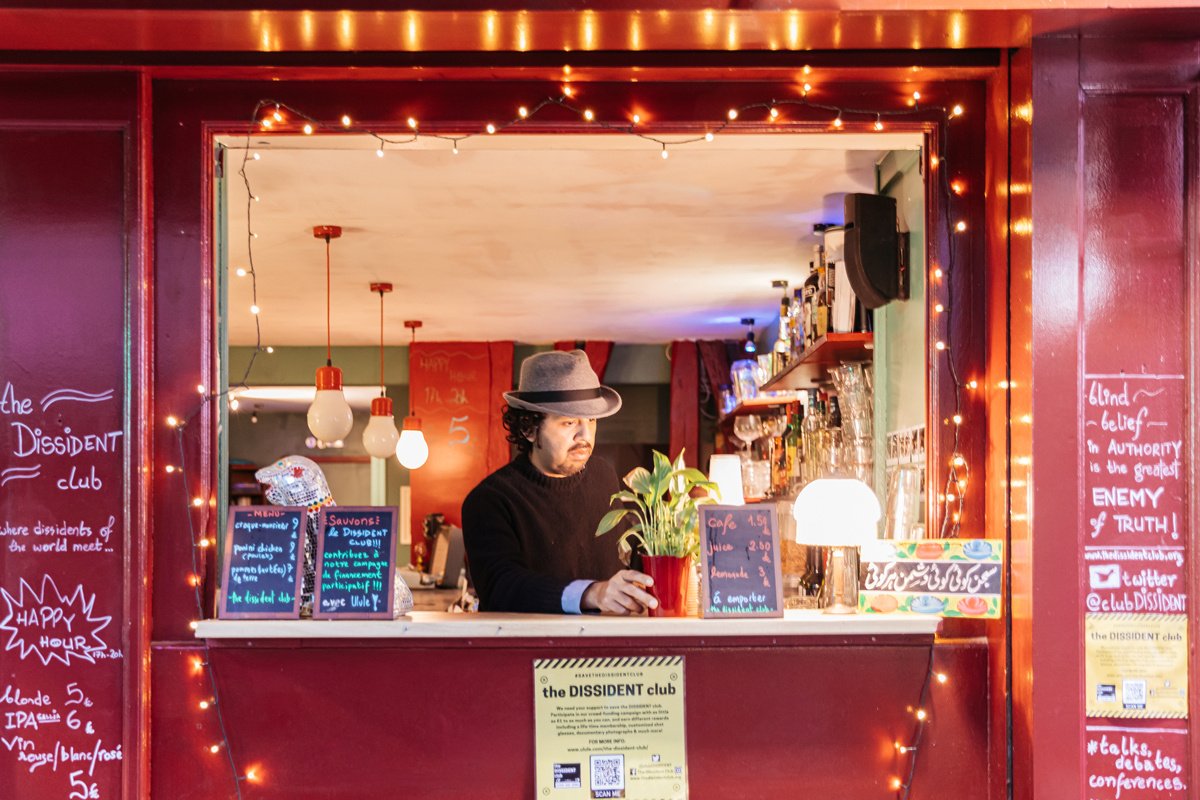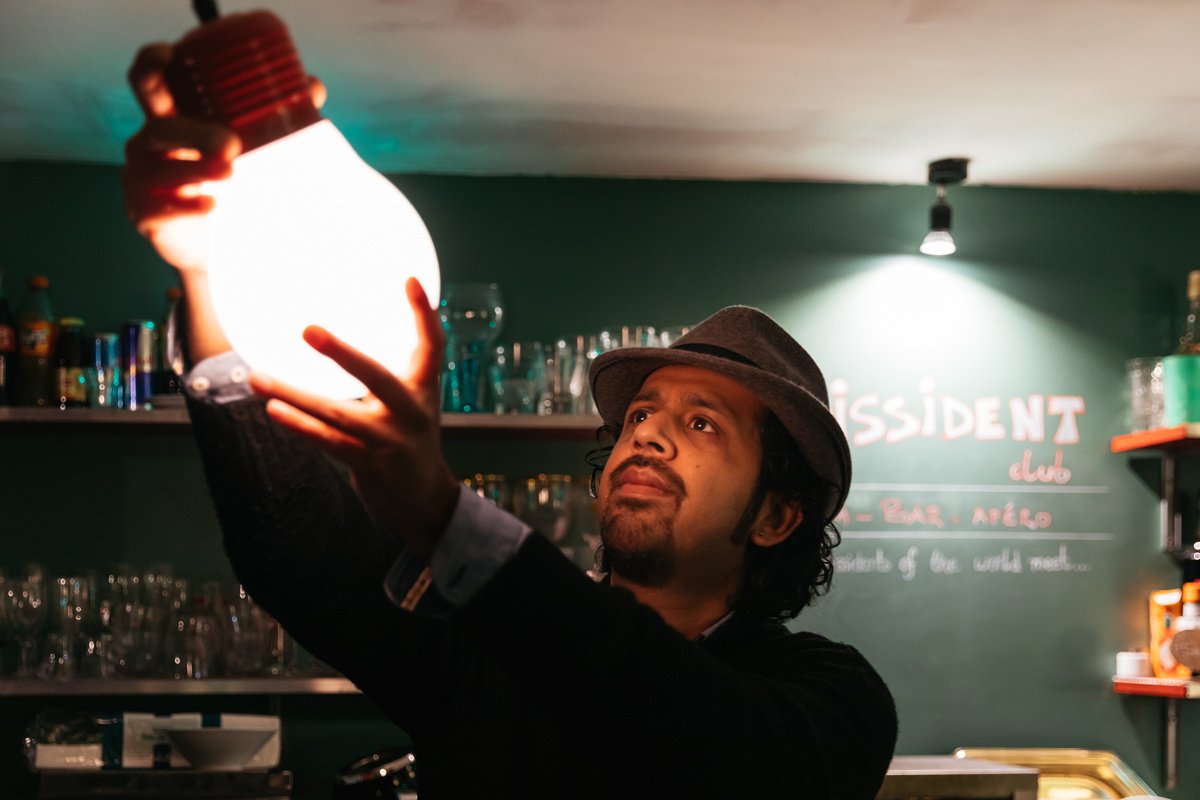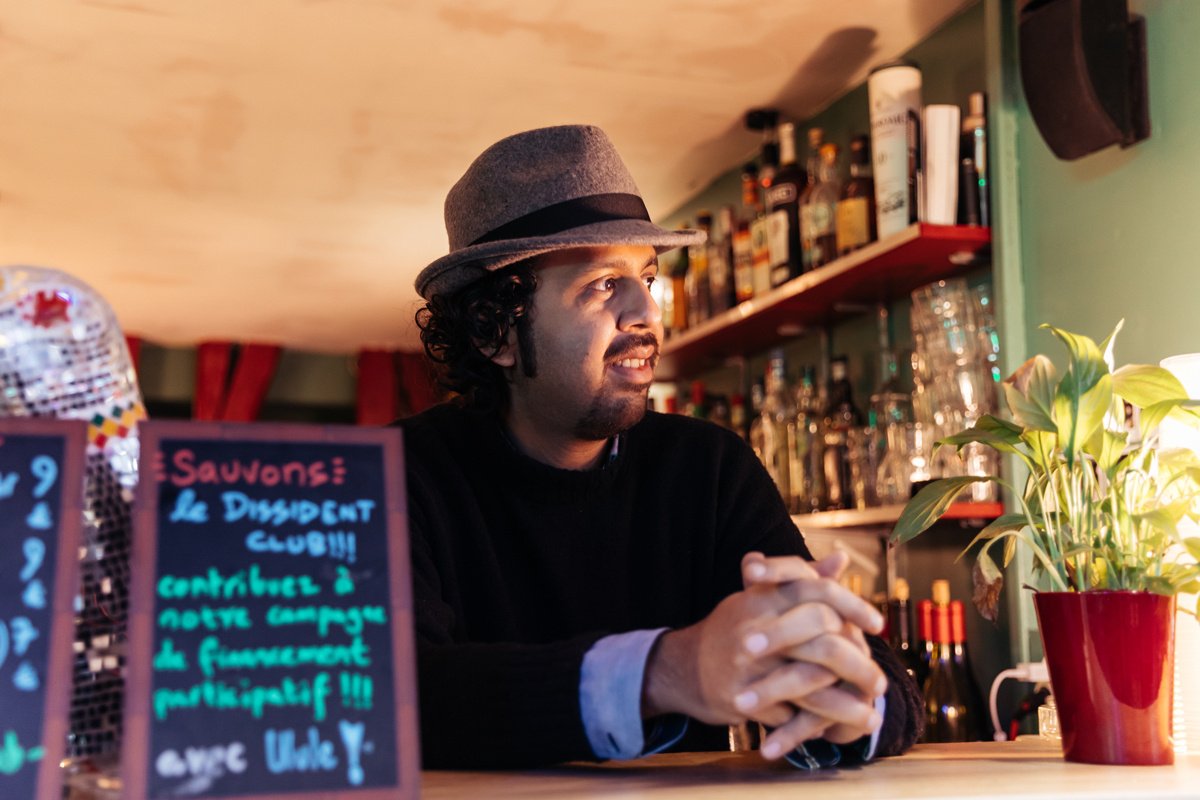Survival mode: Taha Siddiqui, a journalist and entrepreneur in exile
Oct 28, 2020
9 mins
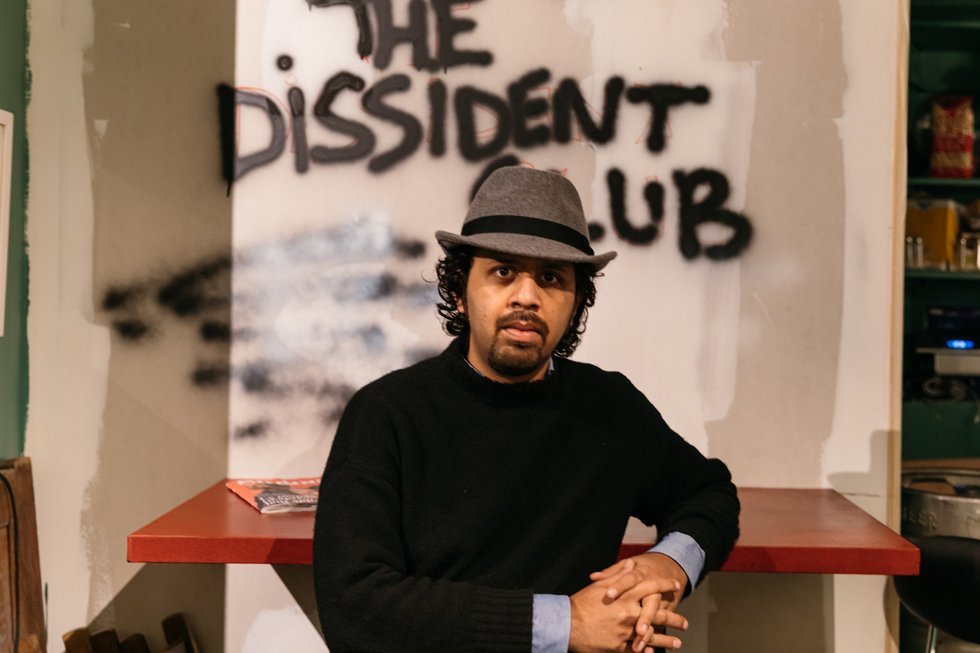
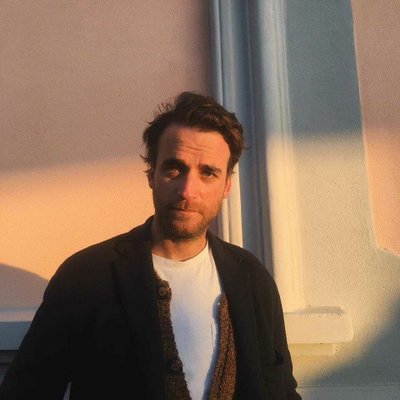
Photographe chez Welcome to the Jungle

Freelance writer & energy regulation analyst
Taha Siddiqui is an award-winning Pakistani journalist. He has been living in exile in Paris since he survived a kidnapping and possible assassination attempt two years ago. He still highlights under-reported stories from Pakistan in the international press and advocates for freedom of expression in the media through his initiative, South Asia Press. Earlier this year, Siddiqui and his wife, Sara Farid, launched the Dissident Club, a bar and café in Paris that brings dissidents of the world together for discussion, debate, and support. Here we find out more about Siddiqui’s testing journey, how safe he feels in exile, and what keeps him going, despite the dangers of his profession.
All of your initiatives seem to stem from your journalistic work. What drew you to journalism as a profession?
I don’t actually have any journalism qualifications to begin with. I got into journalism through a degree in finance. My first job was with CNBC Pakistan as a financial analyst. A year later, in 2007, I started working for Geo TV, one of the main channels in Pakistan. I reported on business and the stock market. But this was a very turbulent time for Pakistan; we were in the final stages of the military dictatorship of General Musharraf. One day, I realized that business reporting is just one niche of journalism and that it can’t be seen in isolation from politics and society. I decided to switch from economic reporting to political economic reporting, and then to reporting on social issues and human rights.
What did you expect working as a journalist in Pakistan would be like, and how was it different?
“Instead of being in a corporate bubble, I got to really explore my country through journalism.”
After a few years of mainstream reporting, I realized there was a lot of self-censorship in the Pakistani media world. There was a lot of control and taboo around topics such as religion and the military. We say journalists aren’t there to create change, but I think we are. We advocate for change in our own way; our reporting may not say “change this”, but by showing what is happening, we do subliminally convey where change is needed. But working with local [Pakistani] media didn’t allow me to do something truly worthwhile with journalism. I couldn’t have the independence I wanted.
This is when I started working with international media, first as a freelancer, and eventually as a reporter for France24. It was my first foray into writing, but it turned out that I write well, and I started writing stories for publications like The New York Times and The Guardian. I never looked back. Instead of being in a corporate bubble, I got to really explore my country through journalism.
You grew up in Saudi Arabia, but have focused on Pakistan and South Asia in your work. Was it difficult, at first, to write critically about a country that is yours but that you didn’t grow up in?
“I could question things people weren’t questioning because they had lived with it comfortably throughout their lives.”
I did grow up in Saudi Arabia and came to Pakistan at 16. In some ways, this was actually lucky. I came to Pakistan with a clean slate, a blank page. Pakistani schools brainwash you to believe in Pakistan, the Islamic Republic, and false histories. I didn’t go through the mass production that happens in Pakistan through education. When I started looking at things from an international perspective, which working with foreign media thankfully gave me the space to do, I began to understand Pakistan from another fresh perspective. I could question things people weren’t questioning because they had lived with it comfortably throughout their lives. I had an advantage rather than a disadvantage.
In 2018, you went into exile in France. Can you describe the events that led you to leave Pakistan with your wife and then five-year-old son?
“The idea was to come to Paris for a little while, wait for things back home to calm down, and go back. I soon realized I may not be able to go back.”
My newfound liberty was short-lived because on January 10, 2018, I was attacked. I was on my way to the airport in Islamabad when my taxi was stopped by armed men. They kidnapped me and made a possible assassination attempt on my life. I believe them to be from the Pakistan military because they had been threatening me for a number of years because of my journalistic work.
I escaped but realized that if I wanted to continue speaking up, I couldn’t do so in Pakistan any longer. I came to France because of the strong media connections and friendships I already had here. The idea was to come to Paris for a little while, wait for things back home to calm down, and go back. I soon realized I may not be able to go back. Partly because I do feel much freer here, but also because I was informed that there is an assassination plot against me in Pakistan. I knew then that I’d be here long term.
As your journalism work evolved to become more critical of the regime in Pakistan, did you have an awareness of the risks involved?
‘There was a running joke among my friends in Islamabad. They’d say things like, “Let’s take a selfie with Taha, because it might be the last.”‘
Oh, yes. Pakistan has existed for almost 70 years, and it has been under either direct or indirect military rule for all that time. When I started being critical, senior journalists would indirectly tell me to be careful. Then the military started telling me directly that I was crossing a line. They would invite me over for a cup of tea and give me friendly reminders to be careful, but these were really warnings, of course. There was a running joke among my friends in Islamabad. They’d say things like, “Let’s take a selfie with Taha, because it might be the last.” Everyone knew I was on the military’s list and could be the next one.
What drove you to keep going despite these very real dangers?
“If none of us speak up, things just get worse. And because a lot of us were not speaking up, I had to do so even louder.”
I continued to do what I did because I felt that someone should. Journalism as a field was under attack, and I felt that simply going out and reporting wasn’t enough—I had to fight back. If none of us speak up, things just get worse. And because a lot of us were not speaking up, I had to do so even louder. I had to compensate. So I was going out of my way to do it.
You still work actively with the French and international media today. Since coming to Paris, how has the nature of your profession changed?
Now, I mostly focus on writing analyses about Pakistan based on what we’re already seeing reported. At the same time, because of my 15 years as a reporter in Pakistan, I developed strong connections with people on the ground. Technology helps a lot to stay connected; people tag and inform me online when there are important stories they want to talk about. Since I’ve gone into exile, I feel like a lot of people reach out to me more, because back home, they can’t talk about their problems. So they reach out and tell me that I should be the one to talk about it, because I have the safety of exile.
Do you feel safe in exile?
“…my father was interrogated by the military intelligence in Pakistan earlier this year. We didn’t know if he was going to come back or not.”
I do feel safer here than in Pakistan, but I wouldn’t say I’m safe. People in exile also get attacked, it’s happening a lot more in Europe. Just recently, an exiled Pakistani journalist was found dead in Sweden. And I know the Pakistani state is still keeping an eye on me. Someone from the Pakistan embassy came to do surveillance at an event at the Dissident Club just a few weeks ago. The military contacts me directly sometimes, asking why I do what I do, telling me to stop.
I also need to think of my family back home. My parents get harassed a lot; my father was actually interrogated by the military intelligence in Pakistan earlier this year. We didn’t know if he was going to come back or not. He ended up denouncing and disowning me as a way to keep the family safe.
How do you find a balance between staying safe and having a job with inherent public visibility?
“Right now I’m threatened by the state, but I almost see that as a confirmation of relevance.”
Even in exile, I am strategic about my journalism. I don’t always say everything I’d like to say, especially on a subject like religion. I’m an atheist and find the role of Islam in Pakistan very problematic, but I don’t talk about that on social media or in my writing, because I know that will bring another set of threats. Right now I’m threatened by the state, but I almost see that as a confirmation of relevance. I continue to haunt them, and that’s exactly what I want. But if I go down certain paths, like criticizing Islam, non-state actors will start to pose a threat, too, and I try to avoid that.
Can you tell us more about the Dissident Club and what led you to start it?
When I realized I’d be here long term, I started looking for something to do in France. I wanted to do something that was an extension of what I was already doing in life: activism, journalism, and advocacy. All of that combined to give birth to the Dissident Club, which I founded with my wife, Sara Farid, a photojournalist. At the Dissident Club, we bring dissidents from all over the world together. On July 14, for example, we held a conference on how safe Europe is for exiled dissidents. There were activists from Russia, China, Iran, Belarus, Turkey, and Saudi Arabia… These connections help with the fights we all face in our own countries, because most authoritarian regimes act in very similar ways, in how they crack down on free speech and political opposition. We can learn from each other.
How is your work at the Dissident Club different from being a journalist? And what is the common thread between these two hats you wear?
“Real journalism connects people with stories, and that’s what the Dissident Club is doing as well.”
At the Dissident Club, we allow people to meet with each other and with French society. And that’s sort of what good journalism does, too. It tries to bring experiences to people who don’t know about these experiences. Real journalism connects people with stories, and that’s what the Dissident Club is doing as well.
The Dissident Club has expanded the scope of my work, now that I’m not only focusing on Pakistan or South Asia. That also increases the risk. Before, I was just challenging the Pakistan military; now I’m bringing in dissidents from everywhere and creating a larger target on my back. I think about that sometimes, but I hope I’m protected enough in Paris. More so than in Pakistan, anyway.
The timing of the opening was very unfortunate—you opened just before the March lockdown. What have the impacts of Covid-19 been on the Dissident Club and how have you been responding to these?
The idea when we launched in February was to do some renovation work with a bank loan, but that did not come through because of the crisis. Instead, with help from friends and family, my wife and I put in all our equity to have six months of cash flow. We also launched an online campaign selling “future drinks” and got another month of cash flow through that.
Still, at some point, we were three months behind on rent. In June, we decided that we couldn’t wait for the renovation before reopening. Around that time, someone who had read about our financial difficulties donated several TV screens, and we started using those to screen documentaries. Of course, Covid-19 combined with the summer period meant the Club was pretty dead. Things started to pick up in September, and we had 10 events planned for October but had to cancel everything when the 9 pm curfew was put in place. We now do events on weekends and earlier in the day.
We’re also trying to offer lunch. We recently bought all the equipment but still need to develop the menu. Our idea—it’s a cliché, I know—was to do “intellectual food”. We never planned on doing “real food” and are new to it. But we’re trying and will hopefully be able to serve lunch in a few weeks.
We recently launched a crowdfunding campaign in the hope that it will sustain us for the next few months.
What events should we keep an eye out for?
“Back in Pakistan, I was very pro-Charlie Hebdo, for example. Since coming to France, I’ve realized there’s a lot more complexity to that debate.”
We want to organize something on the issue of free speech in France. I’m a big advocate of free speech. Back in Pakistan, I was very pro-Charlie Hebdo, for example. Since coming to France, I’ve realized there’s a lot more complexity to that debate. It is not just about free speech, it is also about foreign policy, racism, and islamophobia. We need to discuss all of that. It can be a controversial subject, especially now, so I’m still trying to see what form it should take, but an event should happen in the next few weeks. All the information will be published on our site, so keep an eye out!
Photo: Welcome to the Jungle
Follow Welcome to the Jungle on Facebook, LinkedIn, and Instagram, and subscribe to our newsletter to get our latest articles every day!

More inspiration: Inspiring profiles
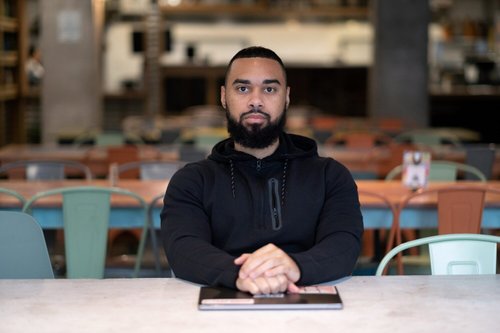
Be real, get ahead: The power of authenticity in your career
Pabel Martinez shares insights on how to allow yourself to be yourself, find your voice, and deconstruct stereotypes at work.
Apr 25, 2024
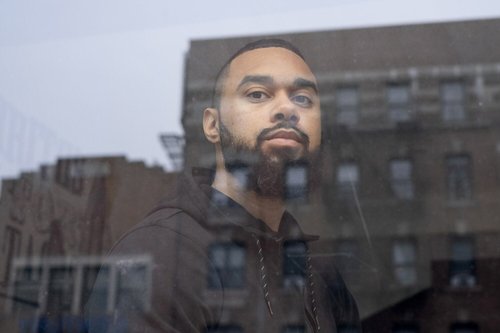
The professionalism paradox: Navigating bias and authenticity with Pabel Martinez
Pabel Martinez challenges the conventional norms of professionalism by unraveling the complexities of workplace discrimination.
Mar 11, 2024
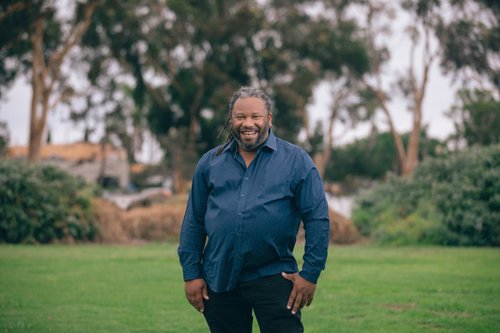
How play can make you happy, creative and productive at work
Work-life balance usually means separating work and play, but it might be a better marriage than you think...
Nov 07, 2023
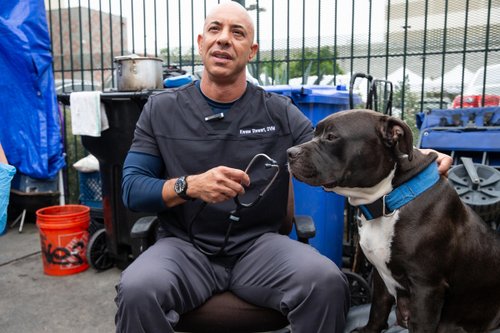
Project Street Vet: Caring for the unseen paws of Skid Row
Providing vet-to-pet care in some of California's largest homeless communities, Dr. Kwane Stewart shares the ups and downs of his remarkable work.
Aug 29, 2023
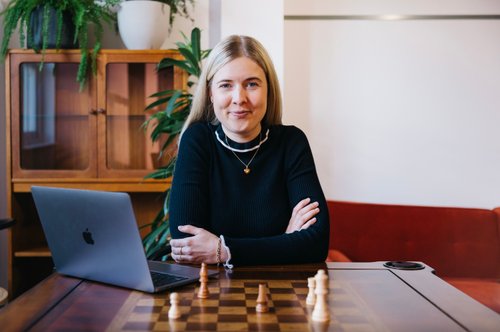
Girls learn how to have fun – and funds – by investing
A Danish trio is fighting gender inequality... on the stock market. We had a chat with one of the co-authors of the book Girls Just wanna Have Funds
Jan 30, 2023
The newsletter that does the job
Want to keep up with the latest articles? Twice a week you can receive stories, jobs, and tips in your inbox.

Looking for your next job?
Over 200,000 people have found a job with Welcome to the Jungle.
Explore jobs
